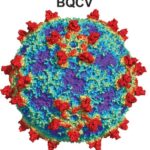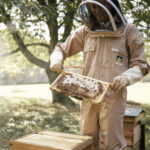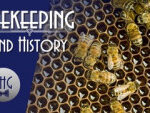Beltsville Researcher Finds Low Genetic Diversity in US Honeybees
 Honey bee imports to the US have been substantially banned since 1922, causing long term concerns about the diversity and sustainability of our stocks of Apis mellifera. Current studies bear this out. Dr. Mohamed Alburaki of USDA/ARS Beltsville recently used a molecular approach, two mitochondrial DNA (mtDNA) markers (DNA specifically from a mother), to analyze approximately 1,063 bees from hobbyist and commercial beekeepers in 45 U.S. states, the District of Columbia (D.C.), and two US territories (Guam and Puerto Rico). The data showed that the nation's managed honeybee populations rely intensively on a single honeybee evolutionary lineage. In fact, 94 percent of U.S. honeybees belonged to the North Mediterranean C lineage. Data reflected that the remainder of genetic diversity belongs to the West Mediterranean M lineage (3%) and the African A lineage (3%)."The honeybee's genetic diversity [is critical] because this indicates the insect's ability to respond to disease, adaptation to environment, and productivity," said Dr. Alburaki. [link]
Honey bee imports to the US have been substantially banned since 1922, causing long term concerns about the diversity and sustainability of our stocks of Apis mellifera. Current studies bear this out. Dr. Mohamed Alburaki of USDA/ARS Beltsville recently used a molecular approach, two mitochondrial DNA (mtDNA) markers (DNA specifically from a mother), to analyze approximately 1,063 bees from hobbyist and commercial beekeepers in 45 U.S. states, the District of Columbia (D.C.), and two US territories (Guam and Puerto Rico). The data showed that the nation's managed honeybee populations rely intensively on a single honeybee evolutionary lineage. In fact, 94 percent of U.S. honeybees belonged to the North Mediterranean C lineage. Data reflected that the remainder of genetic diversity belongs to the West Mediterranean M lineage (3%) and the African A lineage (3%)."The honeybee's genetic diversity [is critical] because this indicates the insect's ability to respond to disease, adaptation to environment, and productivity," said Dr. Alburaki. [link]
General Services Administration’s Pollinator Initiative Opens Up Federal Sites to Apiaries
Making new strides with its Pollinator Initiative, the General Services Administration (GSA) has added apiaries to supported activities under its "Good Neighbor Program." The mission of the Urban Development/Good Neighbor Program is to provide GSA regional offices and their local stakeholders with the technical expertise they need to meet this responsibility around GSA projects and properties. For more information on the Good Neighbor Program, please contact frank.giblin@gsa.gov
GSA has installed honeybee hives at 11 GSA facilities across the countr, and they have awarded a one-year contract to Best Bees Company to manage the hives over the course of a year, analyze honey production from each hive, and identify the plants and landscapes that are specifically beneficial to local pollinators. This information is expected to help guide GSA's future pollinator-friendly landscape design and maintenance policies and practices. [link]
Electromagnetic Fields Impact Honey Bee Pollination Services
Whether from cell phones or power grids, beekeepers have often thought about (and received questions from the public) about the impact of electrical and electromagnetic fields on honey bee activities. In a study published in the May 12, 2023 edition of Science Advances, a group of South American researchers led by Dr. Marco A. Molina-Montenegro were able to conclude that electromagnetic fields around electrical towers have a detrimental impact on honeybee pollination, and by extension, the surrounding plant community. The group used electrical towers rather than power lines for their analyses. First they counted the number of poppies around active versus inactive towers (the latter had more) and then the the levels of a protein called HsP70 in bees—this protein has been shown to be related to stress. As expected, they found higher levels in the bees working closest to the electrical towers. [link]
Black Queen Cell Virus Found in Canadian Mosquitoes
 In 2020, Canadian researchers led by Cole Baril at Brandon University in Manitoba were looking for viruses and other microbes spread by mosquitoes, and did not expect to find a virus known for afflicting honey bees: black queen cell virus (BQCV). Once detected, they went to work to learn what they could about the origin and spread of the virus. As reported in the April 2023 Journal of Insect Science, BQCV is considered ubiquitous in honey bee colonies, but its transmission is not well understood. Scientists used next-generation sequencing of the species Aedes vexans to recreate a 96% complete BQCV genome, most similar, interestingly, to a Swedish strain of the virus. They also picked up fragments of varroa, microsporidian, and plant DNA, leading researchers to speculate that the mosquitoes acquired BQCV at shared nectar sources. [link]
In 2020, Canadian researchers led by Cole Baril at Brandon University in Manitoba were looking for viruses and other microbes spread by mosquitoes, and did not expect to find a virus known for afflicting honey bees: black queen cell virus (BQCV). Once detected, they went to work to learn what they could about the origin and spread of the virus. As reported in the April 2023 Journal of Insect Science, BQCV is considered ubiquitous in honey bee colonies, but its transmission is not well understood. Scientists used next-generation sequencing of the species Aedes vexans to recreate a 96% complete BQCV genome, most similar, interestingly, to a Swedish strain of the virus. They also picked up fragments of varroa, microsporidian, and plant DNA, leading researchers to speculate that the mosquitoes acquired BQCV at shared nectar sources. [link]
More Honey Bee Royalty
 On World Bee Day (May 20th), human beekeeping "royalty" got a spotlight as Britain's Princess of Wales donned a veil, popped open a hive, and was featured on media old and new. While commenters considered this yet another addition to her (apparently considerable) list of super powers, she is just joining in a family pastime (like many of the rest of us). During her childhood, members of her family kept bees, and so do the current King and Queen Consort. Queen Elizabeth famously tapped London beekeeper John Chappie to tend a highly secured apiary at Buckingham palace: he visited to "tell the bees" at her passing. [link]
On World Bee Day (May 20th), human beekeeping "royalty" got a spotlight as Britain's Princess of Wales donned a veil, popped open a hive, and was featured on media old and new. While commenters considered this yet another addition to her (apparently considerable) list of super powers, she is just joining in a family pastime (like many of the rest of us). During her childhood, members of her family kept bees, and so do the current King and Queen Consort. Queen Elizabeth famously tapped London beekeeper John Chappie to tend a highly secured apiary at Buckingham palace: he visited to "tell the bees" at her passing. [link]
"A Short History of Beekeeping" from The History Guy
 Most non-beekeeper YouTube content is cringe-worthy, but in honor of World Bee Day on May 20, The History Guy (Lance Geiger) has produced a high quality, informative and respectful 15 minute video covering the almost-10,000-year-old history of people and bees, from honey hunting to modern management. According to Geiger, "It’s certainly not forgotten history that bees play a vital role in the ecosystem and are a key to pollinating plants all over the world. Lesser known is the deep history between humans and bees that is perhaps as old as any relationship between humans and other species." [link]
Most non-beekeeper YouTube content is cringe-worthy, but in honor of World Bee Day on May 20, The History Guy (Lance Geiger) has produced a high quality, informative and respectful 15 minute video covering the almost-10,000-year-old history of people and bees, from honey hunting to modern management. According to Geiger, "It’s certainly not forgotten history that bees play a vital role in the ecosystem and are a key to pollinating plants all over the world. Lesser known is the deep history between humans and bees that is perhaps as old as any relationship between humans and other species." [link]
[Return to June 2023 BeeLine newsletter]


